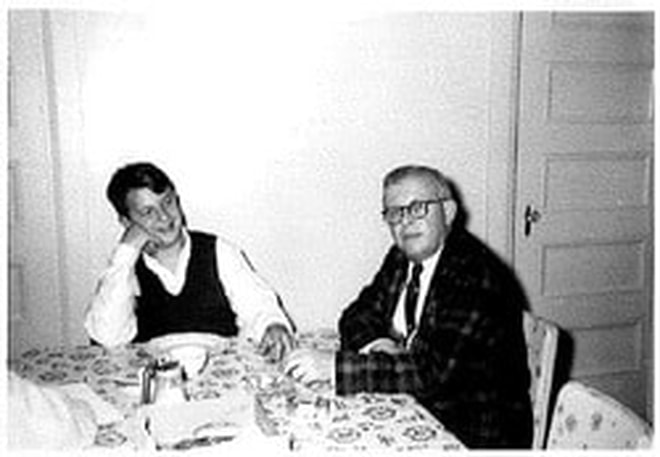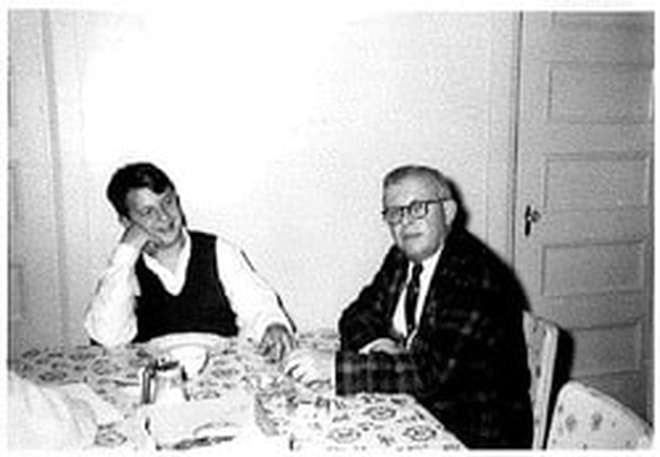God Was in My Father, Kneeling Next To Me
Leslie A. Muray
Episcopal Priest,
My father had been imprisoned in 1953 for libeling the name of Stalin. After nine months he was released from prison, weighing 70 lbs, with his teeth knock out. We opened presents on Christmas Eve. God was not a baby lying in a manger. God was in my father kneeling next to me.
The manner in which Christmas is celebrated in Central and Eastern Europe is quite different from the way it is celebrated in the United States and Western Europe. Santa Claus, St. Nicholas, who is called by different names depending on the country, comes on the evening of December 6th leaving candy on the window sill—if the kids have been good. It is Jesus and the angels (including those called “mom”) who brings the Christmas and presents. However, unlike in the United States and Western Europe, the Christmas and presents are not put up early; they appear Christmas Eve as part of the celebration of the Christ-child.
It seems from what I have seen of Christmas these days in my native Hungary that its observances have gotten increasingly Westernized, the old traditions no longer observed. When I was growing in the early to mid-1950s, most families maintained those traditions even under Stalinism. On Christmas Eve day, fathers would get the children out of the house and do something together. They would come back in the late afternoon and in the early evening a bell would ring. The family would go into whatever room the Christmas tree and presents were in. In awe, they would self-consciously imitate the image of the shepherds kneeling and worshipping the Christ-child. The family would pray and sing Christmas carols before opening the presents.
Two decades later in Claremont, California, I would read a passage in Whitehead’s Science and the Modern World that would always remind me of that reenactment of the manger scene: “The power of God is the worship he (sic) inspires.”
I would like to put those eloquent words again in the context of the Christmases of my childhood. My happiest Christmas was the Christmas of 1953 when I was four years old, about to turn five. My father had come in early December, the best Christmas present I have ever received!
My father had been arrested on March 5, 1953, the day Stalin died, for “libeling the name of Comrade Stalin” (I found out a few years ago that he was also charged with being a Yugoslav spy!). Two weeks later, my mother miscarried. For six months, my mother and I did not know whether my father was alive and, if alive, where he was being kept. After six months, we found that he was alive. My mother got visiting privileges. After nine months, my father came home as a result of a broad amnesty for political prisoners by the reform minded leader Imre Nagy.
I did not recognize him when he came home. Normally he was 5 feet two inches tall and weighed a stocky 170lbs. He came home weighing about 70 lbs. Most of his teeth had been knocked out as a result of frequent beatings. He was deaf on his left ear for the rest of his life. His hair had turned white—the result of a mock hanging!
Christmas Eve day 1953, my father took me to the movies. The first was 6-3. Those numbers may not mean anything to Americans but most Hungarian know as do many British soccer fans: it was the score of the soccer match between the Hungarian “Golden Team” and the British on November 25, 1953, the first defeat of a British soccer team on its home turf in Wembley Stadium!!! The second movie was about the Revolution of 1848, a video copy of which I gave him as a Christmas present thirty-five years later.
As we reenacted the manger scene that night in 1953, my present was not under the tree but kneeling next to me.
“The power of God is the worship he (sic) inspires.” Empires come and go. The effects of coercive regimes may live in people they have hurt yet they too disappear. What lingers is the image of the Christ-child in a manger showing forth that “the power of God is the worship (sic) he inspires.”
It seems from what I have seen of Christmas these days in my native Hungary that its observances have gotten increasingly Westernized, the old traditions no longer observed. When I was growing in the early to mid-1950s, most families maintained those traditions even under Stalinism. On Christmas Eve day, fathers would get the children out of the house and do something together. They would come back in the late afternoon and in the early evening a bell would ring. The family would go into whatever room the Christmas tree and presents were in. In awe, they would self-consciously imitate the image of the shepherds kneeling and worshipping the Christ-child. The family would pray and sing Christmas carols before opening the presents.
Two decades later in Claremont, California, I would read a passage in Whitehead’s Science and the Modern World that would always remind me of that reenactment of the manger scene: “The power of God is the worship he (sic) inspires.”
I would like to put those eloquent words again in the context of the Christmases of my childhood. My happiest Christmas was the Christmas of 1953 when I was four years old, about to turn five. My father had come in early December, the best Christmas present I have ever received!
My father had been arrested on March 5, 1953, the day Stalin died, for “libeling the name of Comrade Stalin” (I found out a few years ago that he was also charged with being a Yugoslav spy!). Two weeks later, my mother miscarried. For six months, my mother and I did not know whether my father was alive and, if alive, where he was being kept. After six months, we found that he was alive. My mother got visiting privileges. After nine months, my father came home as a result of a broad amnesty for political prisoners by the reform minded leader Imre Nagy.
I did not recognize him when he came home. Normally he was 5 feet two inches tall and weighed a stocky 170lbs. He came home weighing about 70 lbs. Most of his teeth had been knocked out as a result of frequent beatings. He was deaf on his left ear for the rest of his life. His hair had turned white—the result of a mock hanging!
Christmas Eve day 1953, my father took me to the movies. The first was 6-3. Those numbers may not mean anything to Americans but most Hungarian know as do many British soccer fans: it was the score of the soccer match between the Hungarian “Golden Team” and the British on November 25, 1953, the first defeat of a British soccer team on its home turf in Wembley Stadium!!! The second movie was about the Revolution of 1848, a video copy of which I gave him as a Christmas present thirty-five years later.
As we reenacted the manger scene that night in 1953, my present was not under the tree but kneeling next to me.
“The power of God is the worship he (sic) inspires.” Empires come and go. The effects of coercive regimes may live in people they have hurt yet they too disappear. What lingers is the image of the Christ-child in a manger showing forth that “the power of God is the worship (sic) he inspires.”


